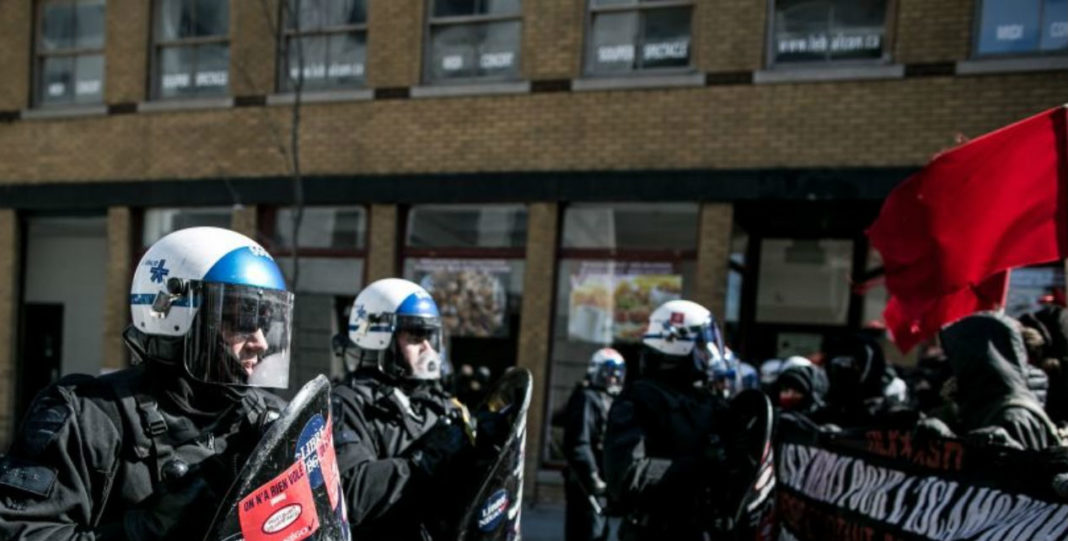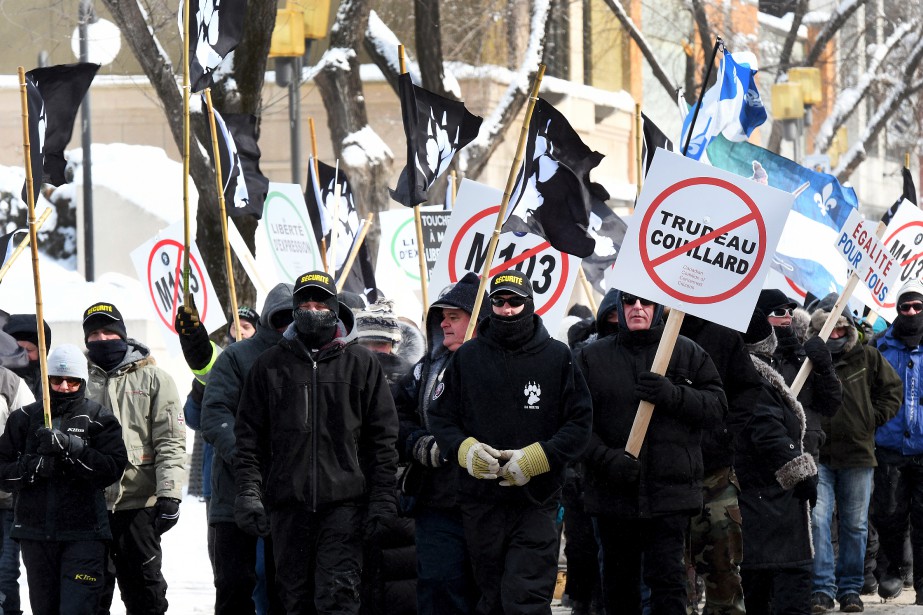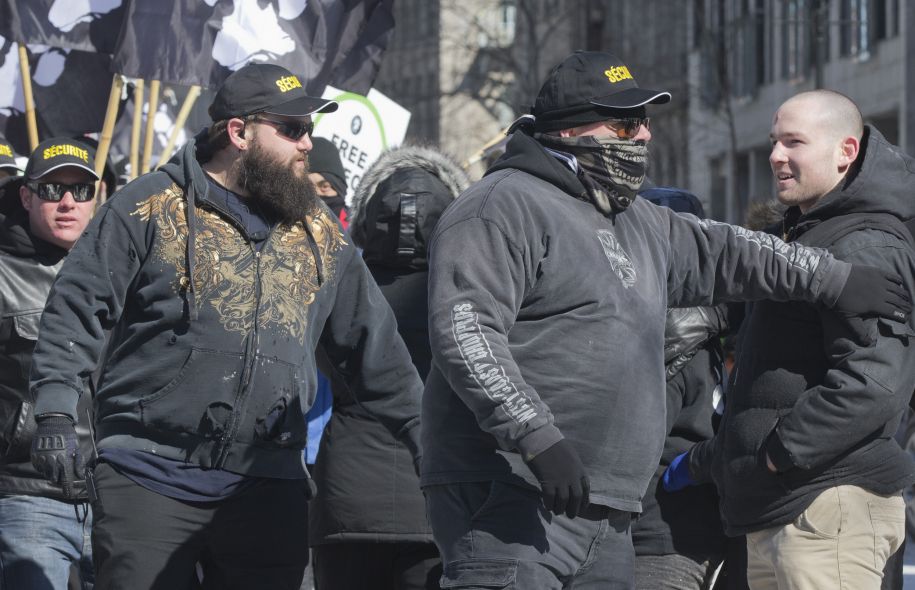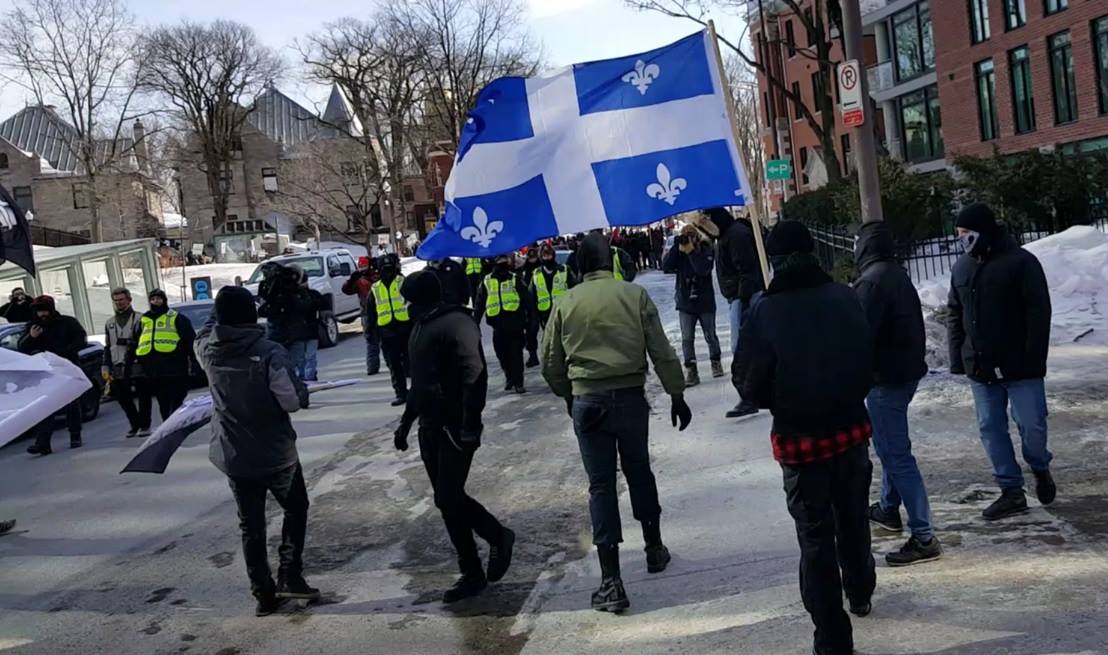Anonymous submission to MTL Counter-info
On March 4th a series of Islamophobic demonstrations had been called across Canada, by a (probably one-person) group known as the Canadian Coalition of Concerned Citizens. Ostensibly the rallies were against Bill M-103, a parliamentary private member’s motion condemning Islamophobia (in the wake of the massacre at a mosque in Quebec City earlier this year), which the CCCC framed as an attack on free speech[1. M-103 is an unremarkable standard politician’s denunciation of racism. It is a non-binding motion calling for the problem of racism and Islamophobia to be recognized and uprooted, for studies to be done and statistics collected, and for solutions to be found, but does not actually suggest anything concrete beyond this.]. So the March 4th rallies were officially “for free speech, against sharia law and against globalization,” and internal guidelines specifically told people not to bring white power or openly racist signs (which of course didn’t stop them from shouting “race traitor” at us as they arrived, or giving nazi salutes).
Georges Hallak, the Montreal-based Islamophobe behind the CCCC, seems to have adopted a “throw it at the wall and see if it sticks” approach, setting up facebook events across Canada for pickets and then posting asking if anybody local could bottomline the effort. Not only did this meet with some success in English Canada — in that local racists did in many cities join in and showed up on the day in question (though generally outnumbered and drowned out by antiracists) — but in Quebec the effort was taken up by the province’s far-Right groups, and became an opening for the first coordinated and united far-Right “coming out” here.
Radical forces in Montreal – generally spearheaded by anarchists and Maoists – have consistently shut down every single known far-Right public gathering for over 20 years now; once again, this time these forces prepared to do what they had in the past. Despite the very cold temperatures (-20 c), about the same numbers came out as at the multiple antifascist mobilizations in 2016 (a few hundred), and some people were prepared to do things. However, what was different was that whereas in 2016 there were at most a dozen racists who showed up, this time there were over 100, with a competent and imposing security detail of their own, and coordinating with police.
Superficially in Montreal, our side held the upper hand — we were more than them, a few of their people did get smacked, a few of their signs and flags were taken by force, the police were positioned to “protect” them from us, and when some of us did outflank the police the fascists were moved away and then finally dispersed –but this was really a failure for us. The racists marched through downtown to get to the rally site;once this racist contingent got there, they were able to hold their corner (protected by cops) for over an hour, putting on an impressive display (big flags, signs, etc.). When finally the police were outflanked and some of our forces were able to get to the racists, the latter were not sent running but under police escort they marched in an orderly fashion back to their starting point, from where they dispersed.
The above has been the goal of the far-Right for years, but those groups that tried (most recently, multiple times in 2015 and 2016, PEGIDA Quebec) have not been able to pull it off — each and every time, their forces were tiny, and they appeared as losers. Today from various reports, and from what we could see on the 4th, they feel like anything but.Given that in the past for every person who showed up on their side, there were a dozen who on social media said they would but did not (out of fear of being vastly outnumbered and humiliated or hurt), the fact that they pulled it off may mean they can do even better next time.
In Quebec City — obscenely, the city where five weeks ago a far-Rightist killed six people and seriously injured many more when he shot up a mosque — things were worse. The far-Right mobilized over 100 people;most of those who showed up were middle aged or older, and probably not the type who would have been up to a physical confrontation. However, a smaller contingent associated with the fascist group Atalante were also present, and at a certain point it looked like they might have been looking for a fight. Given the smaller number of antifascists present on the 4th, it is unclear if the police had not been there, who would have been sent running.
(To contextualize the situation in Quebec City, it should be noted that the week earlier there had been a well-attended anti-racist festival and large anti-racist demonstration; it is not a matter of there not being positive developments on the ground, just that for a variety of reasons these did not translate into a favourable balance of forces for us on the 4th.)
In Saguenay, northeast of Quebec City, there were roughly 100 racists who marched, with half as many antiracists. In smaller numbers, similar forces came together in the cities of Trois Rivieres andSherbrooke.
Both far-Right organizational work, and an unhealthy Islamophobic social environment, helped lay the basis for March 4th.
THE PLAYERS
The CCCC’s call had been taken up throughout Quebec by La Meute (“the wolfpack”), a far-Right organization with an impressive internet presence (over 43,000 members of its zero-security facebook group) that had been biding its time waiting for the moment to stage a major public event outside of cyberreality.
Founded in 2015 by two ex-soldiers, ÉricVenne (alias Eric Corvus) and Patrick Beaudry, the group’s first events were in the Quebec City and Saguenay areas. In August 2016 their fliers started appearing in public places, and a few weeks later Venneand other members disrupted an information event organized by a group of volunteers planning to host a family of Syrian refugees.
As is not uncommon with such groups, La Meute claim to be neither far-Right nor racist, just “against sharia law” and “radical Islam.” Furthermore, and still in line with many but not all such groups, their opposition to Islam is partly justified in terms of the latter being sexist and homophobic; Venne even made a point of attending the vigil in Montreal’s Gay Village following the June 2016 massacre at the Pulse nightclub in Orlando.
La Meute’s stated goal is to become a large political force within the mainstream, however it remains a far-Right group, albeit one that does not like to be described that way.In the words of its media liaison Sylvain Brouillette (aka Sylvain Maikan), “Marine Le Pen is a lot closer to us than Donald Trump.” As shown on the 4th, La Meute aims to attract people ranging from conscious far-Right racists to people who sincerely do not think of themselves that way, but who are motivated by a combination of misinformation and fear about Muslims.
March 4th was an important test for La Meute; had it been trounced, this would have been a major setback. The group has been getting a lot of press based on its large facebook membership, but as we all know in and of itself that is a meaningless thing – in other words, for them, it was a “show up or shut up” situation. Smaller groups (PEGIDA Quebec, Soldiers of Odin), boneheads, and others who either don’t choose to, or who don’t manage to, do anything public with real numbers in Montreal, also joined in. So suddenly all of these little scenes with one person here and one person there, coalesced into something we could not shut down, under La Meute’s protection. People are guessing a lot of people came in from outside of Montreal, which may be true, but is a bit irrelevant. Plus, as there were also rallies in other cities, outside forces in Montreal should have been less of a factor than in previous mobilizations.
And remember: outside of Montreal, antifascist protesters were actually outnumbered by the racists.
Quebec City is the province’s capital; it is a smaller, far more white, and far more conservative city than Montreal. Furthermore, for years now it has been stewing in racist “talk radio” propaganda, which often singles out Muslims as some kind of threat to not only “the West” but to Quebec in particular, often in terms indistinguishable from groups like La Meute. In such a conducive setting, several far-Right groups have been able to develop.
Besides La Meute, another group active in Quebec City is the Soldiers of Odin, an international organization that first started in Finland, largely based around setting up anti-Muslim street patrols. In 2016 the group set up several chapters across Canada, including in Quebec. In January 2017 there was a shakeup in the Quebec organization, with leader Dave Tregget replaced by the Katy Latulippe, a hardliner (Tregget has since set up a new group, the Storm Alliance). According to a recent newspaper article, Latulippe “has vowed to return the Quebec branch of the Soldiers of Odin to its Finnish roots and ramp up patrols of the more Muslim areas of Quebec City. The goal, she says, is not to intimidate Muslim immigrants but rather make them aware of Quebec values.”
One other noteworthy group – that was also active in Quebec City on March 4th, along with La Meute, Soldiers of Odin, and Storm Alliance – is Atalante, a third position group which includes several boneheads and former boneheads (the group has been promoted at shows of the band Legitime Violence). Atalante is a part of the most clearly fascist and unselfconsciously racist tendency in the Quebec far-Right, along with groups like the Federation des Quebecois de Souche (more present in the Saguenay area) and La Bannière Noire (based in Montreal).
While small, Atalante has been busy since it was founded; over the past year it has held two public protests in Quebec City, organized a talk by Italian far-Right intellectual Gabriele Adinolfi (himself one of the founders of Third Position politics) and a public Catholic mass with the Society of Saint Pius X (a breakaway Roman Catholic sect with close ties to the far-Right internationally). As part of its third position approach, Atalante organized events providing free food and toys in working class neighbourhoods – but to “neo-French” only.
On the 4th in Quebec City, whereas La Meute formed the bulk of the demo, it was Atalante who seemed at one point poised to fight with our side. That said, their relationship to the broader anti-Muslim upsurge is not without nuance: in a statement they subsequently posted to facebook they criticized the narrow focus on Islam, saying the real enemies were multiculturalism, mass immigration, and the “banksters” system, and condemning as useless any mobilization that shied away from this. In a similar vein, their banner that day was inscribed with a modified quote from Marx: “Immigration — The Reserve Army of Capital.” (This is not the first time Atalante has made a point of criticizing less ideological racists – recently, they also leafleted a book launch of mainstream Islamophobic journalist Mathieu Bock-Côté, urging a more radical approach.)
SOCIAL CONTEXT
Beyond the involvement and organizational work of specific far-Right groups, there are broader social factors behind the stark difference in how March 4th played out in Quebec and in English Canada. Islamophobia and xenophobia in general are less contested in the public arena in Quebec than elsewhere in Canada, and the left’s response to racism (for generations now) has been far weaker and more incoherent than anywhere else in North America. This is because the complication of national identity and Quebec nationalism was never neutralized or resolved in a liberatory manner here. So while in many other places there is a large non-left section of the population who might be hostile to the far-Right because they see them as being somehow extremist, undemocratic, or otherwise unsavoury (for reasons we would consider not left, but which we still benefit from if only passively), in Quebec that section of the population is far more ambivalent and can swing either way depending on how things are framed. It gives the organized racists a larger pool to fish in, and more room to operate in, on the level of ideas. I.e. they are not always considered “beyond the pale.”
Still, it is worth reminding readers that during the period of the New Left, the so-called “long sixties”, Quebec was a progressive pole within Canada, and the Quebec nationalist movement was dominated by progressive forces. While this is not the place to go into an extended history of what went wrong, some of the roots of the problem can be traced back to this “high point”, where an identification with the anti-colonial forces worldwide, led many Quebecois nationalists to dismiss the possibility of their own nation being an oppressor, or of their own movement being a vehicle of racism. It is not uncommon today to find former radicals, left-wing activists and even leaders from that generation, holding openly racist and far-Right positions. What is perhaps different from other contexts in North America, is that these individuals do not always appreciate the fact that they have switched sides.
Add to this a series of orchestrated racist surges in Quebec over the past ten years, as a populist-nationalist right grew and seized upon Islamophobia as a way to increase its support and outflank their political opponents. Once Islamophobia proved a winning ticket, suddenly everyone wanted to have some, and several of the mainstream political parties – including social democrats and “feminists” and even “leftists” – started either engaging in or tailing anti-Muslim fearmongering, along the lines that they are terrorists or sexists or invaders intent on imposing Sharia law. If March 4th represented a significant far-Right advance, it was on a road paved by not only the mainstream right, but by some “progressives” too.
In addition to the above, the massacre on January 29th, when Alexandre Bissonnette (a far-Rightist) shot up a mosque in the Quebec City suburb of St-Foy, actually encouraged the far-Right. (The mosque had been targeted with Islamophobic vandalism multiple times before, including in June 2016 having a pig’s head left on its doorstep with a note reading “bon appetit.”)
While thousands of people came out in vigils after the massacre, and there was a lot of play in the media about Islamophobia for a few days, the aforementioned national-identity-issue in Quebec made it so that within a week not only the neonazis and fascists, but large swathes of the populist-nationalist right as well had reinterpreted the event as one where Quebec was now under attack by the “multiculturalists” and “islamists” who wanted to “exploit” the killings to clamp down on free speech, to humiliate or slander Quebec as somehow being racist, etc. – all as perfectly symbolized by the (meaningless) Bill M-103. These people sincerely feel that there is a lot of racism in Canada against Quebec, and that any talk of “islamophobia” is a smokescreen for this — and it must be said, this is a position that the left has never neutralized here, even within its own ranks.
While the January 29th massacre was condemned by almost all sections of the far-Right, it is not an exaggeration to say that many see the Quebec nation as having been the real victim. Furthermore, the attack clearly emboldened and encouraged other far-Right forces, and everyday racists, not only in Quebec but across English Canada too. It has been followed by a series of acts of vandalism against mosques, an anti-Muslim bomb threat at Concordia University in Montreal, and renewed attacks on Muslims in the media, especially on talk radio.
This is the context in which March 4th took place.
NOT JUST TRUMP
Quebec is a different nation from English Canada or the United States; while “the Trump effect” plays a part in things here, there are also internal processes at work which were leading in this direction regardless. Indeed, pointing to Trump, or to Canada’s imperialist crimes in the Middle East, as the main factor behind Islamophobia here, has become an argument mobilized by certain figures who seek to downplay or simply deny the deep roots of racism in Quebec. By blaming policies that are decided in Ottawa and Washington DC, such arguments leave Quebec once again the innocent victim, free of all blame.
There are many examples of this, but the most outrageous one is probably the article The New World Order Hits Quebec City by Robin Philpot, a long time anglophone apologist for racism in Quebec (as early as 1991, Philpot was writing that the Mohawk Warrior Society in its conflict with the Quebec State was merely acting as a catspaw for either the CIA or RCMP). Philpot’s “New World Order” article, which first appeared on the Montreal-based Global Research website and was subsequently reposted on Counterpunch, essentially argues that the January 29th massacre was a result of global imperialism, not of any particular problem with Islamophobia here. Indeed, covering up numerous mass-based Islamophobic mobilizations in Quebec, Philpot argues that the province cannot be Islamophobic because … there were large antiwar demonstrations here in 2003!
That such arguments lead nowhere can be shown by the simple fact that they fail to predict or explain things like March 4th.
In order to understand things, Quebec needs to be viewed as a distinct nation, but also as one which is embedded within and largely sees itself as belonging to the broader 21st century supra-national identities of “whiteness” and “the West” – not only in terms of the white West’s crimes abroad, but also in terms of social relations “at home.” This makes Quebec in some ways the same, in some ways different from other purportedly “white” “Western” societies. For instance, in terms of the groups discussed here, many of the intellectual reference points are different (i.e. more European, more hardcore Catholic), and even when they are shared (i.e. the European New Right which also impacted the American alt-right) they play a different role because they came here untranslated and through different channels.
The “strategic quality” of a far-Right breakthrough here, for those of you in the U.S., would be difficult to measure, and might not be much. On the other hand, as recent events have shown, any place these people can advance significantly, can constitute an inspiration or a leverage-point for their ilk elsewhere.
One way or another, what is now on the agenda for those of us in Quebec is to determine the meaning of recent events. For antifascists and other progressive forces, the priority is clear: building on our positions of strength, reaching out to new allies, and making sure that something like March 4th does not happen again.






